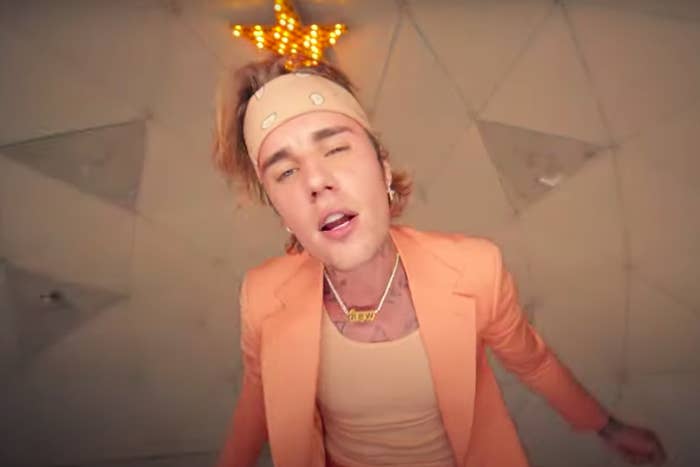
In July 2017, Justin Bieber pulled his emergency parachute. He was in the last stretch of a colossal world tour to support his colossal fourth album, Purpose, and he simply couldn’t do it anymore. With 150 shows across 40 countries completed — a grueling run that lasted 16 months — Bieber had only 14 shows to go, but he was done. He offered a brief apology, and a vague note from Scooter Braun, his manager, filled in the rest of the blanks. “A man’s soul and well-being I truly care about came first and We must all respect and honor that,” Braun wrote on Instagram.
That was the end of the tour. More than a year before that — only months into the start of the tour — a New York Times review noted that Bieber seemed so checked out during the show, you’d think you were watching a “suspected kidnapping in progress, subject forced into high-intensity labor.” Fourteen more months of that life couldn’t have helped.
So Bieber walked away. Sure, he popped up on a guest feature here and there (and, yes, the songs charted, because come on, it’s Bieber), but for all intents and purposes he was out. He got married. He grew a mustache. He got rid of his mustache. He grew it again. He seemed content to coast on his fame and the sporadic feature spot. For three years, he didn’t tour. When he came back with a new album — 2020’s Changes, his first in five years — it seemed like he’d correctly ejected from the mega pop machine and landed safely somewhere he preferred to be. Changes sees Bieber at his most coherent — he is fully comfortable in R&Bieber mode, his voice sounds as silky and effervescent as ever, his vocal runs confident and joyous. It was a grown album, with no radio-targeted missiles but steady bops. It was less of a play for commercial dominance, more of just… a vibe. The singles did fine, but nowhere near the stratospheric successes of “Sorry” and Purpose’s other offerings. And he didn’t seem to care much! Pop stardom be damned, it seemed like he was having fun.
With Changes, we also got insight into what drove him to leave. The album rollout included a ten-part (I know) YouTube documentary series, during which Bieber reveals how dark things got on tour: “Bro, I was like, dying. My security and stuff were coming into the room at night to check my pulse. Like, people don’t know how serious it got.” Though Bieber produced the series, it held together as an intimate and honest look at his darkest moments. His doctors make appearances. The message was not exactly subtle: The frenzied levels of fame during Purpose were not working for Bieber, and he needed to abdicate his King of Pop throne for his own wellbeing.
If fame was the condition, and Changes was the prescription, it’s puzzling, then, to see Bieber pick up sonically where Purpose left off. His sixth album, Justice, arrived last week. It’s an eclectic range of the reigning pop modes — vaguely EDM hooks, acoustic soul, soft ballads, and yes, R&B-infused jams — tied together by consistent big choruses and bright production (and vexing cameos from Dr. Martin Luther King Jr.). It’s an inconsistent album with transcendent highs and tolerable lows. Plenty of songs on it will dominate the charts and the radio. But is this what Bieber wants?
Justice sees Bieber collaborating with pop veterans. Skrillex, who produced the infectious Purpose hits “Sorry” and “Where Are U Now?,” is on deck again with the album’s soft piano opener “2Much” and the cinematic “Somebody.” The Monsterz & Strangers collective, who featured heavily in Dua Lipa’s Future Nostalgia last year, were involved in four songs, including the anthemic “Anyone,” with a chorus built for an arena near you. And Andrew Watt and Louis Bell, essential ingredients in the secret sauce of Post Malone’s hitmaking consistency, are all over Justice, infusing songs like “Deserve You” with Post’s bouncy, hazy bop aura.
One person missing from Justice is Poo Bear, one of Bieber’s longtime collaborators and an established R&B hitmaker who’s worked with the likes of Usher and Chris Brown (and gave us 112’s “Peaches and Cream” — thank you, Poo Bear, we will never forget). Poo Bear has featured on every Bieber album since 2013’s Journals, but is notably absent here. On Justice’s predecessor, Changes, Poo Bear had writing and producing credits on every song.
It is mystifying that the first voice you hear on the album is not Bieber’s but that of Dr. Martin Luther King Jr.
This is to say: Justice sees Bieber coming out of the cocoon he has inhabited for the last four years. This is a competitive album. He is throwing his hat in the ring. The producers and writers enlisted signal that this record is meant to put up a fight against singles from Post Malone and Dua Lipa and co. It’s an album that has its eyes firmly set on the zeitgeist.
You hear this on songs like “Die for You,” an ’80s-sounding synthy romp that is musically in conversation with the Weeknd’s latest offerings. The roster of guest stars, too, feel curated intentionally to hit every angle of the pop spectrum — the Kid LAROI, a rapper/singer/TikTok sensation once mentored by Juice WRLD, lends a hand on “Unstable” and Afrobeats star Burna Boy joins on “Loved by You,” while noted fellow Wife Guy Chance the Rapper guests on “Holy” and Khalid croons on “As I Am.” Justice steadfastly refuses to pick a lane, opting instead to launch an all-out assault on every existing pop aesthetic.
The clearest signal of the album’s ambitions do not come in the music, though — it’s in the album’s positioning. It is mystifying that the first voice you hear on the album is not Bieber’s but that of Dr. Martin Luther King Jr. The first track opens with Dr. King’s now-familiar declaration “Injustice anywhere is a threat to justice everywhere.” And, look, this is definitely true, but it has absolutely nothing to do with the song that follows, about how much Bieber loves his wife. This remains true when we arrive at the midway point and MLK pops up again, on “MLK Interlude,” a 100-second snippet of a speech about standing up for justice regardless of what it costs you, followed by another song about how much Bieber loves his wife.
To say the justice theme on Justice is thin is to give it too much credit. It simply does not pop up anywhere else. It feels like a forced fit, a graceless attempt to inject the album into pertinent social justice conversations that are unfolding, but comes off like a Black Lives Matter statement by Gushers: “Justice” was less a framing device on the album, more of a hollow attempt to land a news cycle or two.
It is hard to imagine Bieber insisting on positioning the album like this. I am not privy to the Bieber Machine marketing meetings, so this is mere speculation, but it’s difficult to conjure up an image of Bieber turning to an associate and saying, “Can we get MLK on this joint?” The gesture is a metaphor, just not for what Bieber and co. thought. It only serves to highlight how vague Justice is — musically, commercially, socially, it’s just all so centerless.
Justice, ultimately, suffers from the same weaknesses of Purpose — albums with bangers, to be sure, but records that are fundamentally shapeless, featuring a pop star marionette going through the pop star motions. Both albums crowd out Bieber’s voice, eschewing making use of his best skills. Bieber is not your big-chorus pop guy, and never has been. His voice has often lacked the power to deliver those hooks. Bieber’s abilities lie in gliding smoothly, and in both albums, we find him instead restrained behind rigid, grand production choices.
Bieber is gifted with a stunning voice and a command of the fundamentals of R&B. He is at his least convincing when he’s playing megastar/pop king.
It should be no surprise that the R&B gestures on Justice transcend. “Peaches,” by far the album’s best song and a career high for Bieber, sees him teaming up with Daniel Caesar and GIVĒON to outstanding effect. It’s breezy and fun and unencumbered, and destined to become the song of the summer. You get deeper insight into how extremely his shit the song is (and, worth noting, also extremely my shit) watching him perform a slowed-down version of “Peaches” in an NPR Tiny Desk Concert. This is Bieber in his element, and it is a treat.
Bieber is gifted with a stunning voice and a command of the fundamentals of R&B. He is at his least convincing when he’s playing megastar/pop king, but he sounds most confident and comfortable in the intimacy of R&B. When the album charts are updated, Justice will likely be his eighth No. 1 album. As his label and his management celebrate this incredible accomplishment (and they should), it might not occur to anyone in the room if this current offering neuters the star’s obvious musical superpowers or restrains his dreams. It might not occur to anyone to let Bieber sing his little songs and do his little vocal runs and then go home and be the Wife Guy that he is. It might not occur to anyone that there are dangers associated with ascending the pop mountain again. If it does occur to them, the thought might be brief and fleeting, drowned out by the soft purr of the pop machine.●
